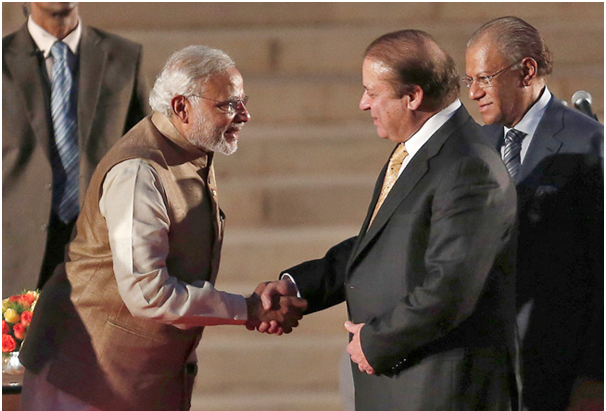A Meeting Foredoomed
Meaningless?

It is easy to see why former foreign minister, Yashwant Sinha, has condemned the the forthcoming meeting between Ajit Doval and Sartaj Aziz, the national security advisers to Prime ministers Modi and Nawaz Sharif as a huge mistake. Pakistan has already used the occasion to avenge itself for the insults the new government heaped upon it last year by inviting the leaders of both wings of the Hurriyat to meet Aziz in Delhi.
This is its revenge for Modi’s abrupt, last minute cancellation of the Foreign Secretaries’ meeting when Islamabad did not accede to its ultimatum to the Pakistan High commissioner not to meet the Hurriyat leaders before leaving for Islamabad. By not immediately issuing a warning to Islamabad , and the Hurriyat leaders against holding this meeting, and parading its indecision by first arresting and then releasing the Mirwaiz and Geelani, Delhi has made matters worse. It is now certain that the meeting itself will now be a fiasco, and will only generate more bad blood between the two countries.
What is hard to understand is what why PM Modi did not see this coming. Did the foreign office not anticipate this , or war this a product of his overweening belief in his powers of persuasion. If so then he cannot have the faintest inkling of how sharply the balance of power in the region has shifted in favour of Pakistan in the past two years and how little it has to gain from better relations with India.
In a nutshell Pakistan has gone from being an international pariah to a valued ally of the major powers once more. As recently as three years ago its foreign debt was close to unmanageable, its relationship with the US was severely strained. In the previous year Washington was using a reduction in aid and payments to force it to stay in the Afghan war, pushing its economy to the brink of collapse, and its relations with Hamid Karzai’s government in Afghanistan were openly hostile.
Worst of all, it had enraged its key ally, China, by allowing Uighur terrorists to operate from its soil, and was itself being overwhelmed by the terrorists whom it had itself helped to create. That was when Prime minister Manmohan Singh’s invitation to Prime minister Yusuf Raza Gilani to attend the cricket world cup semi-final in Mohali, restarted the dialogue that had been broken by the Mumbai terrorist attack, and Pakistan turned to India for help.
Today Pakistan’s position is almost unimaginably different. With the American withdrawal from Afghanistan substantially over, the principal source of tension between it and the US has all but vanished. Instead the US now has a strong vested interest in showing that its 13 year incursion into Afghanistan has done some good. This will only happen if the Taliban can be dissuaded from launching another civil war and eventually be brought to the conference table. Pakistan is its best bet for both because it harbours two of the key groups of players that can make this happen—the Haqqani Taliban and the Quetta Shura.
Afghanistan’s new President, Ashraf Ghani, acknowledged this when he visited Pakistan five months before visiting India, hard on the heels of his visit to China. During that visit he went not to the President’s place in Islamabad first but to the military headquarters in Rawalpindi to initiate an agreement in which Afghanistan will deny sanctuary to the Tehrik –e- Taliban, and Pakistan in return will deny it to the Haqqani Taliban. Ghani has followed this up with an agreement to let Pakistan train the Afghan national army. Clearly both moves have the US’ blessing, because it too has committed itself to giving Pakistan $1.5 billion a year in economic and military aid provided the Pentagon certifies, every few months, that it is doing enough to curb the Haqqani Taliban.
Pakistan’s foreign exchange shortage has also been dramatically reduced by the European union which has increased its trade preference to Pakistan from GSTP—under which 20 percent of imports from Pakistan enter duty -free-- to GSTP plus, which increase it to 100 percent. This has increased Pakistan’s exports to the EU by more than a billion dollars in 2014, and promises to increase them still more.
But all of this has been dwarfed by China’s $46 billion commitment to build 1,000 MW of power plants, mostly nuclear, and a bullet train-cum-super highway in the Karakoram to Gwadar economic corridor. Not only will the investment transform Pakistan’s economy, but the transit fees it will earn from Chinese goods flowing down it to the Indian ocean will make it self-sufficient in foreign exchange.
The plain truth is that the economic weakness and political isolation that had made Pakistan briefly reach out to India in 2011- 14, has vanished. Pakistan’s establishment believes that it no longer needs India for anything. It has supplanted India in Afghanistan; it has duty-free access to a market that dwarfs India, and a north south corridor to extract transit fees from that makes the transit fees from oil and gas and Indo-central Asian trade, that India has been dangling before it, look , to use a phrase once used by Gen Zia-ul Haq about US promised aid to Pakistan at the start of the Mujahideen war, as ‘peanuts’.
So Pakistan does not need to make any concessions to India on Kashmir. Instead, thanks to the Manmohan Singh and Modi governments’ execrable treatment of Kashmir since 2008, everything in that Valley is moving Pakistan’s way.



